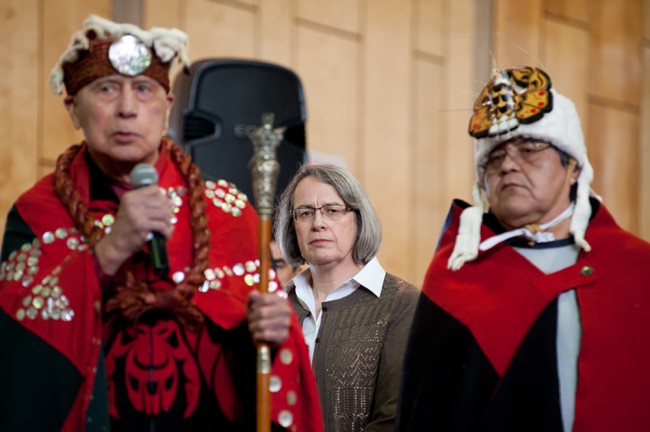
Photo Credit: Keri Coles
In Retrospect
For nearly two years, northern BC was Sheila Leggett’s second home. As chair of the National Energy Board’s joint review panel (JRP) assessing Enbridge’s Northern Gateway Pipeline, she and fellow panelists Hans Matthews and Kenneth Bateman spent their days hearing testimony from local residents.
Despite the intimately raw emotion shared with the panel, a desk divided the Calgary resident from northerners: In an effort to remain neutral, the panelists sat impassive and intent, periodically taking notes as they witnessed tears, anger and frustration during months of testimony in nine northern communities.
It’s been more than three years since the panel submitted its recommendation to the federal government to approve the pipeline with 209 conditions. Last year, courts ruled that the government neglected its responsibility to consult First Nations. The Northern Gateway decision was overturned and, in January, Enbridge quietly withdrew its application.
Raised in Eastern Canada, Leggett moved to Calgary in the late 1970s to pursue a master’s degree in soil ecology. It’s where she met her husband, raised her children, and began a consulting career that blended her work as an environmental biologist with Canada’s oil and gas industry: “That was the very early days of people even beginning to talk about the environment,” she remembers. She joined the NEB in 2006.
“I applied for the position through an advertisement in the paper,” she says. “A lot of people mistakenly think those positions are perks that go to people that are politically involved. I’m living proof that’s not the case. I’m not politically connected to one party or another, because I really believe in working in the public interest.”
Leggett describes herself as a “pragmatist” seeking the place “where multiple views can find common ground.”
On Jan. 9, 2012, as hearings were set to begin, then-natural resources minister Joe Oliver appeared less interested in common ground when he published an open letter to Canadians blaming “environmental and other radical groups” for delaying a process that was just beginning. That March, omnibus bill C38 gutted the Environmental Assessment Act and shifted the pipeline’s final approval to cabinet. The panel was no longer working on a decision, but a recommendation.
Leggett navigated the resulting wave of opinions and emotion by avoiding the media altogether, which also negated the possibility that something reported—but not stated on the record—would stick with her. The process was somewhat isolating, she admits. That didn’t stop her from experiencing northern BC’s communities.
“One thing I did a lot was get to a local yoga studio,” she says. “I always loved the yoga studios because once you enter, everyone is just who they are and you’re not wearing any titles or attachments.”
It was Leggett’s first time on the northwest coast and she was impressed by residents’ openness and authenticity: “I would just go, ‘This is a once-in-a-lifetime experience. I need to appreciate it. I need to take it in for all that it’s providing for both the process as well as my own personal growth.’
“It’s an unbelievable area and I continue to feel very privileged that I had the opportunity to be there and meet so many people who chose to share their thoughts and experiences with us. It reinforced my belief in people. It was a very contentious item. People had very strong views one way or the other.
“As an empathetic person, you feel the emotions. You also feel gratitude for the fact that people stepped up and felt at ease to share that with you. Then you take the key aspects of that and move it forward with the rest of the evidence.”
The panel submitted its recommendation in December 2013. The following June, the Harper government approved Northern Gateway. In June 2016, the Federal Court of Appeal overturned the decision.
“Those are the checks and balances that are in place with the court system we have,” Leggett says. What did come from the hearings, she notes, is a vast record of local knowledge.
“There was this intersection of traditional ecological knowledge and more science-based knowledge,” she says. “I’m really hoping this creates a solid foundation for the integration of social and environmental knowledge for the area going forward.”
Plans got underway in January to review both the NEB and the Canadian Environmental Assessment Agency. Leggett’s thoughts? Don’t muddy the waters with an ambiguous mandate.
“When you have a decision like the Northern Gateway one being overturned based on a government reaction, you could put forward the premise that maybe it shouldn’t be an arms-length agency at all,” she says, adding: “History would suggest that that hasn’t worked because it becomes too political.”
Instead, she suggests an arms-length agency with a clear and regularly revisited mandate. It should be comprised of experts with proven judgment and given policy direction from government. Most importantly: “The board must retain the full lifecycle mandate, from cradle to grave,” she says.
“You need to keep the accountability under one roof. It’s a big job to have that regulatory accountability, it’s a serious job, it’s something that as a Canadian I expect to have out of institutions like the NEB, and if you take apart the pieces I don’t think we can expect the level of accountability that we need to have in the institution.”




This sounds great but is too brief. There is no explanation as to why and no really detailed solution. Empathy needs to be converted to justifiable logic. I would like to hear more.
How do we know how much consultation is enough.
Was this messed up by Joe Oliver’s callous statements?
👤 Ross Harper 🕔 Mar 19, 2017